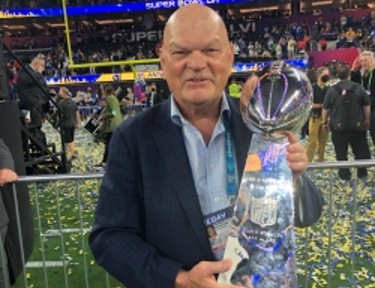
We take a moment to learn from Thom Mayer, MD, FACEP, during this edition of EMPower. Dr. Mayer has been a leader in times of crisis for over 25 years, navigating significant challenges on the global stage.
Dr. Mayer is the Medical Director for the NFL Players Association, as well as an emergency physician-sports medicine leader of international renown and author of several books. He served as the Command Physician at the Pentagon Rescue/Recovery Operation on 9/11, Incident Commander for the inhalational anthrax outbreak in Washington, DC that same year, and led a Team Rubicon Mobile Emergency Team in Ukraine following the outbreak of war. He is among the most widely respected leaders in times of crisis and is a highly sought after speaker and consultant across many businesses and industries.
He was recently nominated to the Pro Football Hall of Fame in Canton, Ohio, and is a member of the Indiana Football Hall of Fame and the Hanover College Athletic Hall of Fame. USA Today named him one of the “100 Most Important People in the NFL.” In sports medicine, his work at the forefront of changing concussion diagnosis and management in the NFL has changed the way these athletes are diagnosed and treated.
What is your favorite thing about emergency medicine?
Everything! I have three boys, and I drove them to school every day. I would say to them that each day is “one more step in the journey of discovering where your deep joy intersects the world’s deep needs.” That’s what my job gives me – deep joy! What we get to do every day is actually pretty profound.
If you were restarting residency, what advice would you give yourself?
Be more kind, thoughtful, and generous. You have the ability to make a difference in every patient encounter. In football, the players spend 3-5 times more time in the film room than on the football field. What does that mean? The preparation matters. When I look back at my training, I see opportunities where I could have been better. I would say that the preparation matters, and make failure your fuel to be better.
What is the most important trait for a leader to have?
To be kind. In fact, the first, second, and third most important traits are to be kind. As Reverend John Watson said, “Be kind, because everyone is fighting a great battle.”
What is your best time management tip?
Do it now. No to-do lists. Only to-don’t lists.
Favorite chief complaint
Trauma. I love things where I can immediately do something and see the effect. However, I think you have to see every complaint and love it and take advantage of its learning opportunity. I’ve worked in high volume emergency departments my entire career, and there’s something to learn from every patient.
What is the most significant risk you have taken and the outcome?
I’ve had multiple entrepreneurial adventures, including my own ambulance company and my own EM practice group. Shakespeare said, “Uneasy lies the head that wears the crown.” When you start something and you’re not sure it’s going to work, it’s scary, but it’s part of life. Without risk, there is no reward.
What is the best on-shift snack?
Swedish fish
What are you learning about right now?
The most recent is escorting 40 D–day veterans back to the Normandy beaches. While I’ve been a student of WWII history for years and grew up around my dad’s friends who were veterans, being immersed in the history was staggering. It’s translated differently when you see it with your own eyes. It helps you realize that every patient has a story, and we are the chief storytellers as emergency medicine physicians. We tell the patients the story of their visit, and we tell the consultants the stories of our patients.
What is your favorite song to hype you up before a shift?
Jimmy Buffett’s Incommunicado
What message would you pass along to the readers of EM Resident?
- The leader you’re looking for is you. Forget someday, and embrace today. The answers are not above us; they are within and among us.
- “Stop sucking up, and start sucking down.” When I was Command Physician at the Pentagon during 9/11, I had to work to secure the scene, so that we could get in there to recover people. I wanted to work with different people as part of a team so that we could go into that building, and do it safely. The people that are “below you” now will be the people you need in the future.
Do you have an idea for someone you want to hear and learn from on EMPower? Please let us know, at emresident@emra.org.



